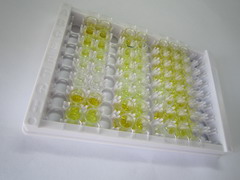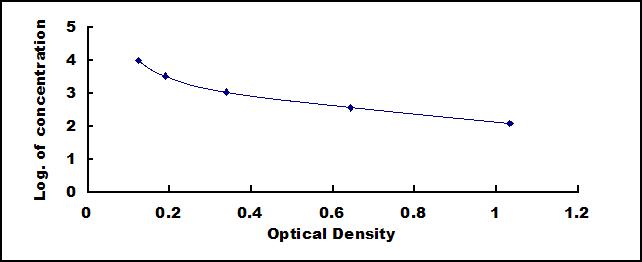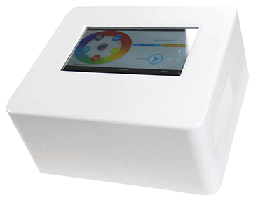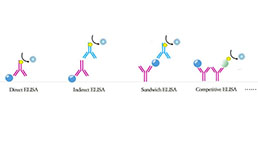Packages (Simulation)

Reagent Preparation

Image (I)
Image (II)
Certificate


ELISA Kit for Trypsinogen Activation Peptide (TAP)
- Product No.CEA634Hu
- Organism SpeciesHomo sapiens (Human) Same name, Different species.
- Sample TypeSerum, plasma, tissue homogenates, cell lysates, cell culture supernates and other biological fluids
- Test MethodCompetitive Inhibition
- Assay Length2h
- Detection Range123.5-10,000pg/mL
- SensitivityThe minimum detectable dose of this kit is typically less than 54.1pg/mL.
- DownloadInstruction Manual
- UOM 48T96T 96T*5 96T*10 96T*100
- FOB
US$ 441
US$ 630
US$ 2835
US$ 5355
US$ 44100
For more details, please contact local distributors!
Specificity
This assay has high sensitivity and excellent specificity for detection of Trypsinogen Activation Peptide (TAP).
No significant cross-reactivity or interference between Trypsinogen Activation Peptide (TAP) and analogues was observed.
Recovery
Matrices listed below were spiked with certain level of recombinant Trypsinogen Activation Peptide (TAP) and the recovery rates were calculated by comparing the measured value to the expected amount of Trypsinogen Activation Peptide (TAP) in samples.
| Matrix | Recovery range (%) | Average(%) |
| serum(n=5) | 92-103 | 99 |
| EDTA plasma(n=5) | 78-97 | 84 |
| heparin plasma(n=5) | 94-105 | 99 |
Precision
Intra-assay Precision (Precision within an assay): 3 samples with low, middle and high level Trypsinogen Activation Peptide (TAP) were tested 20 times on one plate, respectively.
Inter-assay Precision (Precision between assays): 3 samples with low, middle and high level Trypsinogen Activation Peptide (TAP) were tested on 3 different plates, 8 replicates in each plate.
CV(%) = SD/meanX100
Intra-Assay: CV<10%
Inter-Assay: CV<12%
Linearity
The linearity of the kit was assayed by testing samples spiked with appropriate concentration of Trypsinogen Activation Peptide (TAP) and their serial dilutions. The results were demonstrated by the percentage of calculated concentration to the expected.
| Sample | 1:2 | 1:4 | 1:8 | 1:16 |
| serum(n=5) | 92-105% | 79-95% | 82-97% | 83-91% |
| EDTA plasma(n=5) | 78-98% | 90-103% | 96-104% | 93-104% |
| heparin plasma(n=5) | 90-98% | 79-105% | 98-105% | 92-105% |
Stability
The stability of kit is determined by the loss rate of activity. The loss rate of this kit is less than 5% within the expiration date under appropriate storage condition.
To minimize extra influence on the performance, operation procedures and lab conditions, especially room temperature, air humidity, incubator temperature should be strictly controlled. It is also strongly suggested that the whole assay is performed by the same operator from the beginning to the end.
Reagents and materials provided
| Reagents | Quantity | Reagents | Quantity |
| Pre-coated, ready to use 96-well strip plate | 1 | Plate sealer for 96 wells | 4 |
| Standard | 2 | Standard Diluent | 1×20mL |
| Detection Reagent A | 1×120µL | Assay Diluent A | 1×12mL |
| Detection Reagent B | 1×120µL | Assay Diluent B | 1×12mL |
| TMB Substrate | 1×9mL | Stop Solution | 1×6mL |
| Wash Buffer (30 × concentrate) | 1×20mL | Instruction manual | 1 |
Assay procedure summary
1. Prepare all reagents, samples and standards;
2. Add 50µL standard or sample to each well.
And then add 50µL prepared Detection Reagent A immediately.
Shake and mix. Incubate 1 hour at 37°C;
3. Aspirate and wash 3 times;
4. Add 100µL prepared Detection Reagent B. Incubate 30 minutes at 37°C;
5. Aspirate and wash 5 times;
6. Add 90µL Substrate Solution. Incubate 10-20 minutes at 37°C;
7. Add 50µL Stop Solution. Read at 450 nm immediately.
GIVEAWAYS
INCREMENT SERVICES
| Magazine | Citations |
| Diabetologia | Diabetes aggravates acute pancreatitis and inhibits pancreas regeneration in mice SpringerLink: x4l01435t34452jr |
| Molecular Biology Reports | Prior peritoneal lavage with hot 0.9% saline induces HSP70 expression and protects against cerulein-induced acute pancreatitis in rats Pubmed: 23096089 |
| Journal of the Pancreas | Case report of mannose-binding lectin (MBL) deficiency and postoperative sepsis and coagulopathy in a patient following total pancreatectomy for chronic pancreatitis. Pubmed:25262717 |
| Journal of Gastroenterology | A small molecule inhibitor of NFκB blocks ER stress and the NLRP3 inflammasome and prevents progression of pancreatitis pubmed:27418337 |
| Indian Journal of Pharmaceutical Sciences | Effects of Calcium Channel Blockers on Trypsinogen Activation and Severity of Cerulein-induced Acute Pancreatitis in Rats IJPS:Source |
| Tropical Journal of Pharmaceutical Research | Investigation of non-pharmaceutical cures for acute pancreatitis induced by cerulein in rats |
| Pancreas | The Regulatory Effect of the Kinase Inhibitor PD98059 on Autophagic Flux During Trypsinogen Activation in Pancreatic Acinar Cells Pubmed: 32011537 |









